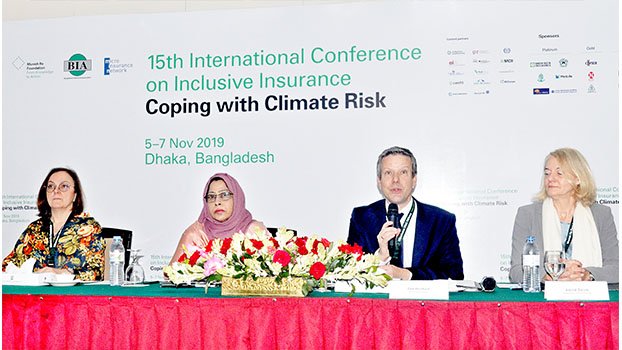‘Microinsurance to bring vulnerable under safety net’


Climate change and extreme weather events are exposing the poorest and most vulnerable to risk as never before, expressed delegates at the press conference on the inaugural day of the15th International Conference on Inclusive Insurance 'Coping with Climate Risk'.
The three day kicked off on Tuesday at the Pan Pacific Sonargaon Hotel in the capital.
They said Bangladesh were cautioned however, that despite staunch international humanitarian support being poured into bridging the protection gap through climate and disaster risk insurance, more must be done at the public and private sector levels to ensure sustainable solutions for millions of uninsured households and small businesses, who are dangerously exposed and prone to catastrophic losses. Bangladesh is one of the most vulnerable countries in the world to the impact of climate change. Rising sea levels and shifting rainfall patterns cause crop losses and cyclones are becoming more devastating and more frequent: already, an average of 300,000 houses in Bangladesh are destroyed each year ."Microinsurance is the best mechanism to bring the economically vulnerable people of the informal economy of a country under the insurance safety and security net and hence make them more resilient and strong." said Professor Rubina Hamid while addressing the press conference
Vice President of BIA, Prof. Rubina also said "Affordable, simple and innovative microinsurance products can provide succour and strengthen the poor to face the risks of climate change. To make the microinsurance mechanism effective, insurance companies should work jointly with all alternative distribution channels, namely microfinance institutions, banks, co-operatives, mobile phone operators and digital companies."
The climate and disaster risk insurance (CDRI) landscape study, undertaken by Insu Resilience Global Partnership, with support from GIZ Regulatory Framework Promotion of Pro-poor Insurance Markets in Asia (RFPI Asia) looked at 22 countries in the Asia-Pacific region.
At individual level, agricultural insurance is the most common form of disaster risk solution in the region and is predominantly driven by private insurers in these markets, through the support of international donors and funding. The study showed that between 2015 and 2018, nine such pilot schemes were founded. However, despite these efforts the combined outreach of these pilot schemes was limited to 95,000 farmers, amounting to a total of US$ 1.3 million in collected premiums. "Disasters like the recent Hurricane Dorian show the importance of building resilience against weather-related disasters," said Dirk Reinhard, Vice Chairman of the Munich Re Foundation, co¬organiser of the conference.
He said insurance complemented by disaster prevention measures play an important role for sustainable economic development. However, appropriate insurance solutions against climate risks are still not available for the most part.
"This conference aims at being an eye- opener for governments, insurers, donors and regulators to increase their efforts and not only develop appropriate insurance solutions, but also educate customers on what insurance can and cannot do, strengthen capacity building and learning to apply technological solutions that are key to reducing costs, as well as strengthen distribution channels", he added.
Dr. Astrid Zwick, Head of InsuResilience Secretariat added, "The need to bring together global expertise and converge action on adaptation for a resilient future is more urgent than ever before. The InsuResilience Global Partnership has set the ambitious Vision 2025: to shape a unique platform that pushes for a substantial scale-up in the use of pre-arranged risk finance and insurance mechanisms, embedded within comprehensive disaster risk management, and complementing broader resilience and adaptation efforts."
Insurance has an important role to play in mitigating some of these impacts, and in avoiding a reversal in the impressive gains made over the last 20 years. The insurance sector in Bangladesh is small, even by emerging Asian standards. According to Milliman, life insurance penetration represents approximately 0.4% of GDP only3.
"It is critical to improve access to responsible insurance by vulnerable households. We are proud to be launching our Landscape Study on Africa at the Conference, and pleased that in 2020, we will have the opportunity to focus on uptake of microinsurance in Bangladesh, along with other countries in Emerging Asia, Africa and Latin America and the Caribbean," said Katharine Pulvermacher, Executive Director of Microinsurance Network, co-organiser of the conference.
Around 400 inclusive insurance experts from over 40 countries are expected in Dhaka for the 15th International Conference on Inclusive Insurance from 5-7 November 2019.


